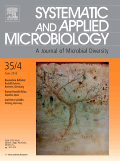
SYSTEMATIC AND APPLIED MICROBIOLOGY
Scope & Guideline
Championing Excellence in Systematic Microbiology
Introduction
Aims and Scopes
- Taxonomic Classification and Nomenclature:
The journal emphasizes the systematic classification and nomenclature of prokaryotes, including the establishment of new genera and species, and the revision of existing taxonomic frameworks. - Microbial Ecology and Diversity:
Research published in the journal often explores the ecological roles and diversity of microorganisms in various environments, including extreme habitats, which contributes to our understanding of microbial life and its applications. - Biotechnological Applications:
There is a strong focus on the biotechnological potential of newly discovered microorganisms, particularly in areas such as bioremediation, agriculture, and industrial processes. - Genomic and Metagenomic Studies:
The journal frequently features studies utilizing genomic and metagenomic approaches to uncover insights into the functional capabilities and evolutionary relationships of microorganisms. - Environmental Microbiology:
Research on microbial interactions within environmental contexts, such as soil, water, and extreme ecosystems, is a significant component of the journal's scope.
Trending and Emerging
- Prokaryotic Naming Codes and Nomenclature:
There is an increasing emphasis on the SeqCode and other nomenclature codes for prokaryotes, highlighting the importance of standardized naming practices in the field. - Novel Taxa and Phylogenomic Analysis:
An apparent trend towards detailed phylogenomic studies that accompany the description of new species showcases the journal's commitment to integrating genomic data into systematic microbiology. - Microbial Interactions and Symbiosis:
Research exploring the interactions between microorganisms and their hosts, particularly in symbiotic relationships, is gaining traction, reflecting a growing interest in ecological dynamics. - Extreme Environment Microbiology:
A notable increase in studies focused on microorganisms from extreme environments (e.g., hypersaline, thermophilic) indicates a trend towards understanding microbial resilience and adaptation. - Microbial Biotechnological Potential:
There is a rising focus on the biotechnological applications of newly described species, particularly in the fields of bioremediation, agriculture, and industry, reflecting a practical application of systematic microbiology.
Declining or Waning
- Traditional Culture Techniques:
Papers relying solely on traditional culture methods for microbial isolation and characterization are becoming less common, as the field shifts towards more advanced genomic and metagenomic techniques. - General Microbial Pathogenicity Studies:
There has been a noticeable reduction in papers focusing broadly on microbial pathogenicity without a strong emphasis on systematic classification or novel species description. - Non-systematic Microbial Surveys:
Surveys that do not contribute new taxonomic insights or systematic understanding of microbial communities are less frequently published, reflecting a shift towards more detailed and systematic studies.
Similar Journals

INDIAN JOURNAL OF MICROBIOLOGY
Connecting Ideas, Cultivating Microbial ExcellenceINDIAN JOURNAL OF MICROBIOLOGY, published by Springer, serves as a vital platform for the dissemination of cutting-edge research in the field of microbiology. With an ISSN of 0046-8991 and an E-ISSN of 0973-7715, this esteemed journal invites contributions that span various disciplines within microbiology, encompassing both fundamental studies and applied research that can impact health, environment, and industry. Recognized in the Q3 category in Microbiology for 2023, and ranking #80 out of 182 in Scopus’ Microbiology category, it reflects its commitment to quality and significance in the academic community. Authors and researchers benefit from the journal's comprehensive review process, which enhances the visibility and reach of their work. While no open access options are currently offered, the INDIAN JOURNAL OF MICROBIOLOGY remains a premier choice for those aiming to contribute to the ongoing dialogue in microbiological studies, ensuring that knowledge continues to evolve and thrive.

FOLIA MICROBIOLOGICA
Pioneering Discoveries for a Healthier Tomorrow.FOLIA MICROBIOLOGICA is a distinguished academic journal published by SPRINGER, focusing on the intricate realms of microbiology and its contributions to medicine. Since its inception in 1957, the journal has been a vital platform for disseminating pioneering research, addressing contemporary challenges in the field while facilitating discourse among researchers, clinicians, and students alike. With an ISSN of 0015-5632 and an E-ISSN of 1874-9356, FOLIA MICROBIOLOGICA publishes original articles, reviews, and critical insights that span not only traditional microbiological studies but also innovative applications in immunology and biotechnology. The journal is categorized within the esteemed Q2 tier in Medicine (Miscellaneous) and holds a Q3 rating in Microbiology as of 2023, reflecting its significant impact and relevance in the scientific community. Although it does not currently offer open access, it remains a respected resource, enabling professionals and students to keep abreast of advancements from its base in the Netherlands. With a strong commitment to quality and rigorous peer-review, FOLIA MICROBIOLOGICA serves as an essential repository of knowledge, fostering the next generation of microbiologists and medical practitioners.

ANNALS OF MICROBIOLOGY
Illuminating the path of discovery in applied microbiology.ANNALS OF MICROBIOLOGY is a prestigious journal dedicated to advancing the field of microbiological research, published by BMC, renowned for its commitment to providing open access to vital scientific findings. With its ISSN 1590-4261 and E-ISSN 1869-2044, this journal provides a platform for the dissemination of high-quality research since its inception in 1997. Renowned for its rigorous peer-review process, it has attained a commendable Q2 ranking in the Applied Microbiology and Biotechnology category in 2023, reflecting its significant contributions to the discipline. Positioned within the 67th percentile among its peers in Scopus rankings, ANNALS OF MICROBIOLOGY continues to facilitate the exchange of innovative ideas and methodologies, serving as an essential resource for researchers, professionals, and students alike. The journal covers a broad spectrum of topics, emphasizing the intersection of microbiology with applied sciences, thereby fostering an environment that encourages collaboration and advancement in this vital field. Scholars seeking to stay at the forefront of microbiological studies will find ANNALS OF MICROBIOLOGY an invaluable addition to their academic pursuits.
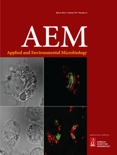
APPLIED AND ENVIRONMENTAL MICROBIOLOGY
Connecting Science and Sustainability Through Microbial InsightsApplied and Environmental Microbiology, published by the American Society for Microbiology, stands as a leading journal in the fields of applied microbiology and environmental science since its inception in 1976. With a prestigious Q1 quartile ranking across multiple categories including Applied Microbiology and Biotechnology, Ecology, and Food Science, this journal consistently disseminates high-impact research that drives innovation and advances our understanding of microbial interactions within our ecosystems and industries. As ranked by Scopus, it exhibits prominent rankings in various related fields, underscoring its critical role in shaping contemporary microbiological research. Researchers, professionals, and students alike can stay abreast of groundbreaking studies while contributing to a vast body of knowledge that spans diverse aspects of microbiology, biotechnology, and ecology, ultimately contributing to sustainable practices. Join the community of dedicated scholars and explore vital research findings that impact both environmental health and technological advancement.

INTERNATIONAL MICROBIOLOGY
Cultivating Insights Across Microbial DisciplinesINTERNATIONAL MICROBIOLOGY, published by SPRINGER, is a prominent peer-reviewed journal showcasing research across the diverse field of microbiology. Since its inception in 1998, the journal has provided a vital platform for the dissemination of innovative microbiological findings, with a focus on both fundamental and applied aspects of the discipline. Boasting an impressive Category Quartile ranking of Q2 in Medical Microbiology and Q3 in General Microbiology as of 2023, INTERNATIONAL MICROBIOLOGY stands out in the metrics of academic influence, ranking 60th out of 140 in the medical context and 90th out of 182 within the broader field of immunology and microbiology. This journal not only caters to senior researchers and academics but also engages budding scientists and professionals eager to stay abreast of the latest developments in microbiological research. Published without open access, it diligently curates quality content that contributes to the ongoing discourse in microbiology, ensuring that all articles uphold the highest academic standards. As the field continues to evolve, INTERNATIONAL MICROBIOLOGY remains committed to fostering scholarly communication and advancing microbiological knowledge on a global scale.
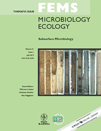
FEMS MICROBIOLOGY ECOLOGY
Advancing Knowledge in Microbial Ecology and SustainabilityFEMS Microbiology Ecology is a prestigious journal published by Oxford University Press, specializing in the dynamic field of microbiology and its ecological implications. With an impressive impact factor and consistently ranked in the top quartiles (Q1) across multiple categories—including Applied Microbiology and Biotechnology, Ecology, and Microbiology—this journal serves as an essential resource for researchers and professionals aiming to advance their understanding of microbial interactions within ecosystems. Established in 1990 and spanning to 2024, FEMS Microbiology Ecology delivers cutting-edge research, reviews, and insightful discussions that illuminate the complex roles microorganisms play in environmental health and sustainability. Located in the United Kingdom, this journal provides a global platform for discourse, making significant contributions to both theoretical frameworks and practical applications in the biotech and environmental science sectors. Researchers and students alike will find a wealth of information that not only enriches their knowledge but also inspires innovative solutions for ecological challenges.

TRENDS IN MICROBIOLOGY
Empowering Researchers with Cutting-Edge Microbial KnowledgeTRENDS IN MICROBIOLOGY is a premier academic journal published by CELL PRESS, renowned for its high-impact research contributions in the fields of microbiology, infectious diseases, medical microbiology, and virology. With an impressive impact factor and a notable Scopus ranking—placing it in the top tiers of its categories, including a remarkable Q1 status in multiple disciplines—this journal is essential for researchers, professionals, and students aiming to stay at the forefront of innovative microbial research and ongoing advancements in pathogen biology. Since its inception in 1993, TRENDS IN MICROBIOLOGY has provided a platform for thought-provoking reviews and critical insights, fostering discussions that shape the future of the microbiological sciences. Based in the United Kingdom, TRENDS IN MICROBIOLOGY continues to lead the way in disseminating vital knowledge within the global scientific community.
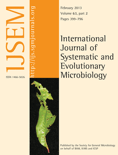
INTERNATIONAL JOURNAL OF SYSTEMATIC AND EVOLUTIONARY MICROBIOLOGY
Charting the Evolutionary Pathways of MicroorganismsInternational Journal of Systematic and Evolutionary Microbiology, published by the Microbiology Society, stands at the forefront of microbiological research, focusing on the systematic and evolutionary aspects of microorganisms. With its ISSN 1466-5026 and e-ISSN 1466-5034, this prestigious journal not only boasts an impressive impact within its fields—ranked Q1 in both Ecology, Evolution, Behavior and Systematics and Medicine (Miscellaneous), and Q2 in Microbiology for 2023—but also consistently provides an open access platform for researchers to disseminate their findings. Established in 2000, the journal has established itself as an essential resource for professionals and students alike, offering insights into microbial diversity, systematics, and evolutionary pathways. By providing a rich repository of knowledge with a global reach from its UK base, IJSEM continues to enhance our understanding of the microbial world, fostering collaboration and innovation in microbiological science.

Microbial Physiology
Innovating Insights in Microbial PhysiologyMicrobial Physiology is a premier, peer-reviewed journal published by KARGER, dedicated to advancing the field of microbiology through innovative research and reviews. With an ISSN of 2673-1665 and an E-ISSN of 2673-1673, the journal stands out in the academic landscape having established a strong track record since its inception in 2020, converging its scope until 2024. It proudly holds a Q2 category ranking in several key areas including Applied Microbiology and Biotechnology, Biochemistry, and Microbiology, making it an essential resource for researchers and professionals in these disciplines. The journal provides open access options to ensure that cutting-edge findings are widely disseminated, fostering collaboration and knowledge sharing. As a vital contributor to the ongoing discourse in microbial physiology, the journal serves as a platform for novel discoveries and methodologies that can significantly impact health, industry, and environmental sustainability. Located in Basel, Switzerland, it brings together a global community of scholars eager to further explore the complexities of microbial life.
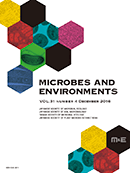
MICROBES AND ENVIRONMENTS
Exploring the Intricate Dance of Microbes and Their EnvironmentsMICROBES AND ENVIRONMENTS is a prominent academic journal dedicated to advancing the field of microbial ecology, published by the Japanese Society of Microbial Ecology. Since its inception in 1996, the journal has provided a vital platform for disseminating innovative research and insights into the intricate relationships between microbes and their environments. With an impressive impact factor reflected in its Q2 rankings across multiple categories, including Ecology, Evolution, Behavior and Systematics, Medicine, Plant Science, and Soil Science, MICROBES AND ENVIRONMENTS is acknowledged as a significant contributor within the ecological and biological sciences community. The journal’s content, which spans over two decades of cutting-edge research, supports researchers, professionals, and students in enhancing their understanding of microbial functions and their critical roles in various ecosystems. The journal does not operate under an open access model, ensuring that submissions undergo a rigorous peer-review process that upholds its reputation for quality. Engage with MICROBES AND ENVIRONMENTS to explore the ever-evolving landscape of microbial research and its implications for environmental sustainability and public health.